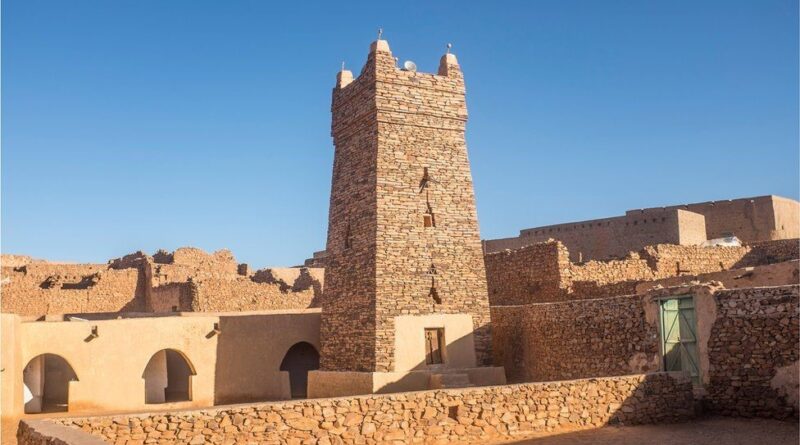Have you seen a city with a library in the Sahara Desert
The town of Chinguetti, situated at the edge of the vast sand dunes of Mauritania, has been sheltering the travelers for the last 1,200 years.
This oasis city was established in the 8th century amidst the Sahara Desert.
The caravan of pilgrims going to Mecca for Jiyarat used to stay here.
This oasis with red stones gradually became one of the largest centers of science, religion and mathematics in West Africa.
Scholars of law, medicine, and astronomy also lived here. Pilgrims and scholars kept coming here.
Conservation of manuscripts
Religious books, scientific studies and manuscripts of historical importance continued to be prepared in Chinguetti.
From the 13th century to the 17th century, there were 30 libraries in Chinguetti where manuscripts were kept and preserved.
Today there are five libraries of them.
The patrons of libraries keep more than 1,000 manuscripts of the medieval Quran from the sands of Sahara.
Saif al-Islam is the patron of one such library.
He says, “Our forefathers wrote books and manuscripts on various subjects, such as religion, astronomy and astrology.”
The walls of red stone buildings in the city are wide. There are small wooden doors between them.
When you go inside, thousands of manuscripts are found, which are kept in wooden and cardboard boxes.
Saif al-Islam wears gloves in hand before touching the manuscripts, then extracts a manuscript of astronomy.
He says, “This is a scientific book. See, it has written about the constellations Cancer and Libra.”
“Long before Copernicus and Galileo, Muslims knew that the earth was round and rotating.”
Right of men
Saif al-Islam dreamed of becoming a library patron since childhood. He used to help other patrons and tourists.
He says, “My luck was good that I am a man. No woman can be the guardian of a library.”
“There are many women who can do this job well, but when they get married, their husbands become the owners of the entire collection. In this way, the ancestral property is passed on to another family.”
The Sahara Desert is expanding. As it is moving south, sand has started accumulating on the flat roofs of Chinguetti buildings.
“Between 1930 and 1995, many families moved to big cities because there was no grass left for their camels and no jobs,” says Saif al-Islam.
“The migrating families took their manuscripts with them. Only 12 of the 30 libraries now remain in Chinguetti and only 5 or 6 of them open.”
Due to changes in climate, the incidence of cloudburst and inundation in the city has increased. Even manuscripts are being destroyed.
In such a situation, the future of this precious treasure of Islamic knowledge and science is hanging in the balance.
Saif al-Islam says, “Some books were on the top floor of a house. They were ruined when it rained. Some manuscripts ate goats. Some books were torn by children in the games.”
No source of income
Owning a library in Chinguetti is a matter of social prestige. It is not considered as a source of income.
Bechir Al Mohammed of the Institute of Research and Science says, “Most owners of manuscripts have no idea what to do. Their fathers knew this. This is the biggest problem with manuscripts.”
The owners of the libraries know enough that they have an ancestral treasure.
“Of course they are right. They have a treasure but they do not know what is in that treasure.”
“We are trying to tell them how important these things are. It is not enough to keep this treasure, it is also important to protect them from wind and water.”
Chinguetti did not have a good day. Now tourists are less in this city. People have started forgetting books.
Saif al-Islam is training some children.
He says, “Two or three of them are capable. But I cannot say for sure whether they will be able to maintain the library or not. I think the new generation is not excited.”
No protection money
Bechir al-Mohammad says that some people have large libraries but they do not have the money to preserve them. This is a big problem.
“I know two libraries whose owners live in Saudi Arabia. We need to preserve the manuscripts in good condition. They don’t have to leave unclaimed in the sand of Chinguetti. We have to. We don’t give up is.”
Conservationists tried to remove the manuscripts from Chinguetti to save the collection, but the people of the city feel that the books are the heritage of their forefathers.
Saif al-Islam says, “It is impossible to separate your home, your hands, your feet, your eyes, and then protect them.”
“If we are given voluntary help, we will approve. But neither the Government of Mauritania, nor UNESCO or any other organization is capable of it.”
“They don’t even have the right to preserve this heritage. This is our heritage.”



